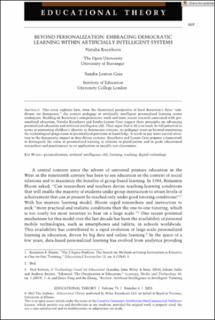| dc.contributor.author | Kucirkova, Natalia | |
| dc.contributor.author | Leaton-Gray, Sandra | |
| dc.date.accessioned | 2024-02-07T10:51:11Z | |
| dc.date.available | 2024-02-07T10:51:11Z | |
| dc.date.created | 2022-01-24T18:01:49Z | |
| dc.date.issued | 2023 | |
| dc.identifier.citation | Kucirkova, N. & Leaton-Gray, S. (2023) Beyond Personalisation: Embracing Democratic Learning within Artificially Intelligent Education Systems. Educational Theory | en_US |
| dc.identifier.issn | 0013-2004 | |
| dc.identifier.uri | https://hdl.handle.net/11250/3116134 | |
| dc.description.abstract | This essay explains how, from the theoretical perspective of Basil Bernstein's three “conditions for democracy,” the current pedagogy of artificially intelligent personalized learning seems inadequate. Building on Bernstein's comprehensive work and more recent research concerned with personalized education, Natalia Kucirkova and Sandra Leaton Gray suggest three principles for advancing personalized education and artificial intelligence (AI). They argue that if AI is to reach its full potential in terms of promoting children's identity as democratic citizens, its pedagogy must go beyond monitoring the technological progression of personalized provision of knowledge. It needs to pay more careful attention to the democratic impact of data-driven systems. Kucirkova and Leaton Gray propose a framework to distinguish the value of personalized learning in relation to pluralization and to guide educational researchers and practitioners in its application to socially just classrooms. | en_US |
| dc.language.iso | eng | en_US |
| dc.rights | Attribution-NonCommercial-NoDerivatives 4.0 Internasjonal | * |
| dc.rights.uri | http://creativecommons.org/licenses/by-nc-nd/4.0/deed.no | * |
| dc.subject | AI | en_US |
| dc.subject | KI | en_US |
| dc.subject | kunstig intelligens | en_US |
| dc.subject | utdanningsvitenskap | en_US |
| dc.title | Beyond Personalisation: Embracing Democratic Learning within Artificially Intelligent Education Systems | en_US |
| dc.type | Peer reviewed | en_US |
| dc.type | Journal article | en_US |
| dc.description.version | publishedVersion | en_US |
| dc.rights.holder | © 2023 The Authors | en_US |
| dc.subject.nsi | VDP::Samfunnsvitenskap: 200::Pedagogiske fag: 280 | en_US |
| dc.source.journal | Educational Theory | en_US |
| dc.identifier.doi | 10.1111/edth.12590 | |
| dc.identifier.cristin | 1988927 | |
| dc.relation.project | Norges forskningsråd: 2519269 | en_US |
| dc.relation.project | Norges forskningsråd: 275576 | en_US |
| dc.relation.project | Jacobs Foundation: PR-10919 | en_US |
| cristin.ispublished | true | |
| cristin.fulltext | original | |
| cristin.qualitycode | 2 | |

